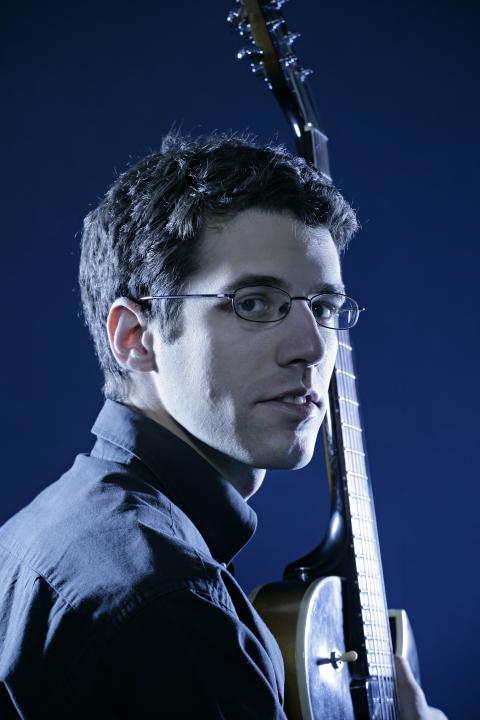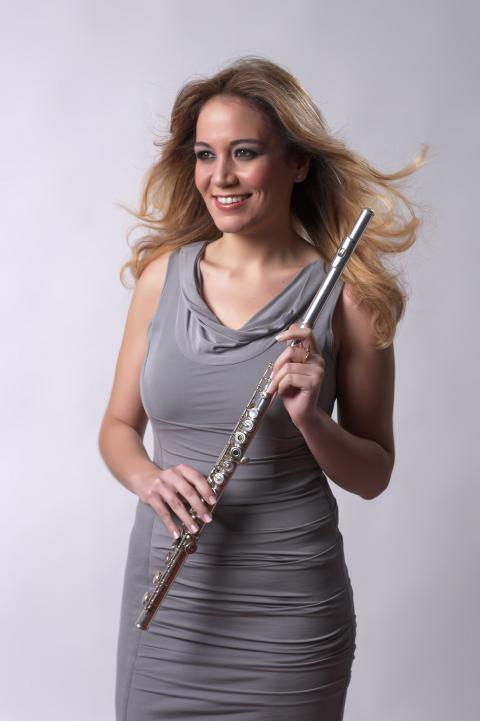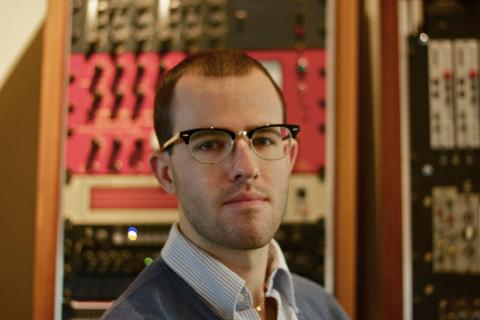Bright Lights in Europe

Less than a decade after graduating from Berklee, award-winning jazz guitarist David Doruzka '02 of Prague, Czech Republic, has become a sought-after musician throughout the European continent and Scandinavia. He is highly regarded for his thoughtful approach to music in general and his controlled guitar virtuosity. Doruzka plays with a range of acts including his own trio as well and artists based in several different countries.
When we met at Prague's Café Louvre in August, Doruzka had just returned from gigs in Stockholm with the Swedish band Stoner. Closer to home, he's been working with the Tiburtina Ensemble, an octet of Czech female classical vocalists who underpin their renditions of Gregorian chant and Spanish medieval music with jazz improvisation provided by a trio of guitar, drums, and woodwinds. This fall, Doruzka was tapped by French bassist Nicolas Moreaux for a recording session in Paris with New York-based saxophonist Bill McHenry. Doruzka also collaborates with Polish singing sensation Aga Zaryan in the studio and onstage. He contributed four pieces to her celebrated album Looking Walking Being, that offered a winning combination of Brazilian rhythms with contemporary jazz influences.
"For me, the nice thing about being in Prague, is that it's easy to go and play in the other countries in Europe and meet players there," Doruzka says. "That would be more difficult if I was living in New York."
In fact, after completing his studies in performance and jazz composition at Berklee in 2002, Doruzka moved to New York to explore the jazz scene there, but stayed for little more than a year. In the final analysis, his New York experience could be viewed either as a case of bad timing or good fortune. Doruzka soon discovered that work for musicians and others in New York had become scarce after September 11. "A lot of people moved away from the city," he says. "I enjoyed being there and learned a lot. I met a lot of players, but decided to return home in 2003." His time in New York nudged him in a direction that would ultimately prove fruitful on a few levels.

David Doruzka '02
In Prague, plugging back in was simple. Doruzka had played extensively in the city's jazz clubs since he was 14. At 15, he'd won the Talent of the Year award from the Czech Jazz Society. When he returned, he brought a home souvenir from his American sojourn. Before leaving New York, he recorded his first album Hidden Paths, with Berklee alumni Kendrick Scott '03 (drums) and Massimo Biolcati '99 (bass). It connected with Czech music fans in a big way and won Doruzka his first Andel (a prestigious Czech music award) in 2004. His Silently Dawning CD, featuring his jazz settings of poems by Emily Dickinson and others, won him a second Andel in 2008 as best CD in the Jazz & Blues category.
Among the many interesting aspects of Doruzka's guitar playing is his pristine technique. He never deploys his formidable chops just to dazzle, only in service of the music. "It has been my goal to avoid trying to impress people with technique," he says. "I get bored by music that's based on showing off technique." In addition to his sense of restraint is his very unique use of the harmonic resources of his instrument. His compositions feature highly colorful and unusual chord voicings and progressions.
"At Berklee, Mick Goodrick was my teacher for about a year and a half," Doruzka says. "He has a very deep sense about harmony. For a time, I was approaching the guitar like a piano in terms of harmony. Now I think of it more as a guitar and look for harmonic ideas that are difficult but possible on the guitar."
In addition to plenty of recording and performing, Doruzka has also added teaching to his schedule. He teaches one day a week at the Janácek Academy in Brno, and a second in Prague at the Jaroslava Jezek Conservatory and College. "At this point in my life it feels totally natural to teach," he says. "I'm enjoying it and have really good students. Since my son was born, I'm trying not to be away from home as much as I was before."
Doruzka's father Petr and grandfather Lubomír are music critics. In fact, in the 1940s, Lubomír Doruzka was the first Czech critic to write about jazz. Given his pedigree and experience, David Doruzka is poised to continue adding to the legacy of jazz in Prague.
Getting Them to Feel Something
A high point last summer for Lisbon-based singer, songwriter, and multi-instrumentalist Adriana '05 was opening for Seal at the CoolJazzFest in July in the stylish beach town of Cascais, Portugal. She recalls the day being unseasonably cold, which made playing the flute-one of her trademarks-a bit of a challenge. But performing her original songs to an enthusiastic crowd of 5,000 was more than enough inspiration for her to give it her all onstage. "The people were really warm and receptive because they know my music too," Adriana says. "The time went by really fast."
Known as Adriana Rosario Duarte during her Berklee years, she's become known simply as "Adriana" to throngs of Portuguese music fans since she launched her career two years ago. A gifted instrumentalist and singer, Adriana graduated from the conservatory Fundação Musical dos Amigos das Crianças in Lisbon as a classical flute major before setting her sights on Berklee. After acing her scholarship audition in Paris, Adriana packed her bags for Boston.
"I was originally interested in studying music therapy at Berklee," she says, "but instead I majored in professional music. That allowed me to study a little bit of everything, including performance and music production. It's weird that I didn't take any songwriting courses and now I'm a songwriter. I started writing songs later. I also played mostly contemporary classical flute music at Berklee -- no jazz. I started playing jazz on GB gigs around Boston."

Adriana '05
The label had enough confidence in Adriana's musicianship to give her carte blanche to produce her first record. "That was at of the end of the big-label deals, and I went all out," she says. "We recorded in Boston and in New York at Avatar Studios with top musicians and mastered it at Sterling Sound. I spent the whole budget!"
It all paid off when the first single, "Cara ou Coroa," became a hit in Portugal and was licensed for use in a popular soap opera. "The song was nominated for a Golden Globe award in connection with the TV show," Adriana says. "You always need one song to push your album, and that one did it for mine. People reacted very well to the album."
Adriana's music blends pop, jazz, and world music elements mixed with hints of fado, a melancholic style of traditional Portuguese song. In her shows, she features her flute playing prominently, a sound she says is rarely heard in music by other Portuguese groups. The press has dubbed her "a one-woman band" because she plays flute, piano, and guitar. (She's planning to introduce electric kalimba to the mix soon.) Adriana's song lyrics are in Portuguese, but on her 2011 sophomore album, O Que Tinha de Ser (What Had to Be), the song "Walking Back Home" has English lyrics. So far, two singles from that disc have hit the airwaves. "There are radio stations here that are dedicated to pop, some to jazz, and some to Portuguese music," she says. "My album can get played in each of those formats, and is getting played a lot -- which is awesome."
Adriana performs primarily in Portugal, working to develop a strong base at home before going after festival and concert bookings in other European countries. Around Christmastime, she will release a live-concert DVD filmed with her five-piece band at a popular theater in the Belém section of Lisbon. She is also writing tunes for a third album, which she plans to release in 2013. To date, three of her songs have been placed in TV shows viewed by millions. Adriana is hopeful that her songs will soon be synched in movies.
At heart, Adriana is a performer first and foremost. "I love making records," she says, "but I see myself mostly as a touring artist. I want to reach as many people as possible. I'm not focused on trying to get a Grammy. That would be nice, but I really just want to play my music in as many places as possible and keep making a living at it. The most rewarding thing for me is seeing people smiling or getting emotional when I'm playing. I want them to feel something."
Team Player

Cecil Remmler '10
Born in Basel, Switzerland, and raised in Lanzarote, in Spain's Canary Islands, Remmler was surrounded by music during his childhood. His father, Stephan Remmler, is a songwriter and singer who—with his group Trio—broke out in Germany during the 1980s with the international hit "Da Da Da." He later pursued a successful solo career. Cecil began classical piano studies at six at a conservatory in Lanzarote and was influenced by father's career in pop music. "I saw my father making music, and started making my own on a little PC," Remmler recalls. "I got my first Mac with Logic [music production software] when I was 11. That was a big deal because I could record audio. My brothers and I were making music for fun, and my dad started working with us."
With dad coaching, Cecil and his two brothers formed the teen band CecilJonniLauro. They signed with Warner Bros. and had two hits in Germany. I was heavily involved in the production and played keyboards on the recordings," he says. After the group folded, Cecil helped his father make his latest album 1, 2, 3, 4 in 2006 and played keyboards behind him on tour.
Before coming to Berklee, Remmler had created a lot of music on his computer. "Whenever I made music, it was always kind of electronic and poppy music. I have hard drives full of beats. When I learned about Berklee, I was excited about going there to study film scoring and learn more about production."
While studying at Berklee, Remmler was hired by a German movie director to supply music for scenes in the film Vollidiot. Remmler's experience and studies in film scoring and electronic production made him an ideal fit his current position with Numarek.
Pompetzki and NZA are among the most sought-after writers and producers in Germany and beyond. NZA is an urban-music specialist creating beats and Pompetzki is an expert mixer, producer, and songwriter. "They've had success with European artists such as Swiss pop star Stefanie Heinzmann," Remmler says. "In the States, they had a hit last year with the Miley Cyrus song 'Can't Be Tamed.' They've worked with lots of big names and had one song go multiplatinum in Japan. They hired me because they wanted input from someone with a different background. I do the things that call for [electronic] orchestral sounds, like string arrangements. That stuff comes quickly to me."
Since Remmler joined, the team has co-written songs for Stefanie Heinzmann with American songwriter and vocal producer Mischke. Pompetzki, NZA, and Remmler built the tracks and Mischke, known as a great "topliner" wrote the melodies and lyrics.
The Numarek team also created 17 tracks for the album One by Edita, the winner on the German show X Factor, and collaborated on a song for neo-soul singer Aloe Blacc. "We've also been doing some commercials in house," says Remmler. "That's where my background from Berklee really comes in handy. We've done scores for two short films too. One of them, Two Friendly Ghosts, has won awards.
"I am very thankful for Marek and Paul giving me this opportunity. I want my work to add value to this relationship. If all I was doing was playing keys or recording drum parts on a keyboard, I wouldn't be bringing anything to the table. They could do that. I need to bring something that elevates the whole project."
While Numarek is best known for working with German artists, they continue to build connections with American songwriters and artists. "The big market is the States," Remmler says. "I hope to work towards becoming one of the names you see on hit tunes when you look at the charts. I want to keep this going at a high level."
Alyssa Landry '85
Alyssa Landry '85 has a story that is the reverse of the others profiled here. She has a burgeoning career in Paris as a singer, actress in musical theater and television, and writer for the theater and TV. Landry grew up in Scituate, MA, and was first drawn to musical theater at age 12. After high school, she enrolled in Oberlin College to study French and German but soon realized that music was in her blood. She transferred to Berklee as a vocal performance major.
After earning her degree, Landry and two other alumni decided to go to Paris for a year. "Jean-Philippe [Reza '84] was my boyfriend at the time," Landry recalls. "He was an MP&E major and found a job at a studio. Through him, I started singing jingles and doing backup vocals on songs of all different styles. A requirement for the work was that I needed to sing in French with no [American] accent. That was a huge motivator for me to get rid of my accent."
Landry immersed herself in French language and culture and began playing gigs in a range of styles. After her romance ended, she decided to stay on in Paris. "I joined a choir at the American Church in Paris because I thought that would be a way to become part of a social community." Landry saw ads on the church bulletin boards about auditions for musicals, and made some calls. She landed a spot in the chorus for a production of Porgy and Bess. "I started working with the director who also led the American Chorus and Orchestra of Paris," she says. "Eventually, I became his assistant leading the chorus and worked with him for five or six years."
That connection led to an opportunity to an audition for the Paris production of Cats in 1989. "I was hired as one of the 'booth singers,'" Landry says. "While the cast was onstage breathless from dancing their hearts out, there were four booth singers in the orchestra pit singing all of the choral parts for them." Landry later sang on the cast recording for the show.
After Cats closed, she got a part in Les Misérables. "That show ran for eight months," she says. "Musical theater work is not as steady in Paris as it is in other countries, you always need to do other things. So I was also taking studio gigs and singing at Disney [theme park] in Paris and as a soloist at the American Cathedral."
Landry has since worked with the French casts of Nine, Hello Dolly, C'est Pas La Vie?, Beauty and the Beast, and many more. She has also made English adaptations of theater works that have been performed in the United Kingdom. Amid all that was a two-year run as a singer on French TV variety show Les Années Tubes.
In 2007, she cowrote the original musical comedy Jusqu'aux Dents, with Emanuel Lenormand. The show won a prize from Society of Dramatic Authors and Composers, the French equivalent of ASCAP. The show just may be the opening of a new chapter in her career. The story line follows three friends, women in different phases of life who are pregnant at the same time. Landry played one of the characters. After a short run in the theater, a TV director who saw the production and asked Landry and Lenormand to rewrite the show as a sitcom for French TV. At the time of this writing, they were waiting to hear whether funding has been approved for them to write two additional episodes and film the pilot. "If it happens, it will be fantastic," Landry says. "If not, it wasn't anything we were really looking for. Emanuel and I are about to start working on a new musical."
This fall she is singing in Cinderella, a children's show running in one of the largest theaters in Paris. In an ironic twist, Gerald Sibleyras '85, the other Berklee alumnus with whom Landry went to Paris after graduation, has since become a playwright and cowrote the version of Cinderella in which Landry will perform. "I was really surprised when I got the score and libretto and saw his name on it," she says. "I hadn't seen him in 16 years, so I called him up and said, 'This is Alyssa, and I'm going to be in something you wrote.' How cool is that? We've since gotten together. We both have families now and it was fun to see how our careers have evolved from the same starting point at Berklee."
In July 2010, Landry was invited by conductor David Charles Abel to sing in a Stephen Sondheim birthday concert at the Royal Albert Hall in London. Sondheim has been an inspiration to Landry since her Berklee days. "To be onstage with Sondheim and the great soloists for this huge televised event was fantastic," she says. "I sort of feel like that was the height of my ambitions. If everything else could hit that level, that would be great."




